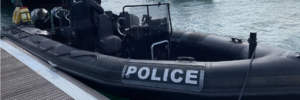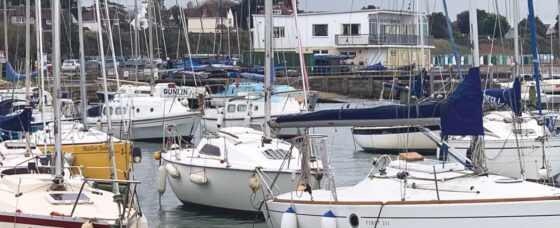
UK’s Police CPI releases new advice for marine security in wake of boating boom

A post-pandemic boom in boating has corresponded to a notable increase in theft and damage of marine equipment, according to the police-owned non-profit Police Crime Prevention Initiatives (Police CPI).
Lockdown was linked to a year-on-year increase in boat sales of nine per cent in 2020, according to figures from British Marine, as people in the UK looked closer to home for their leisure activities.
Police CPI says that accurate crime statistics on marine crime are difficult to come by – but is thought to be highly underreported.
“Marine crime is very difficult to try and impact upon without the support of owners and stakeholders – we have large quantities of very valuable property that is, by its nature, often left unattended in isolated locations for long periods,” says Police Sergeant Matthew Gransden, from Hampshire Constabulary’s Marine Unit. “This means we’re predominantly alerted to acquisitive crime a significant time after the incident occurred and evidence can be hard to come by.”
Thieves are attracted to all kinds at marinas and sailing clubs, such as outboard motors, life rafts and electronic/GPS equipment, however other objects are stolen too – radios, mobile phones, laptops, fishing tackle, personal items and even the boat itself. Making sure that a craft is secured along with the equipment onboard can help to prevent losses via theft.

Police CPI is working in conjunction with the Border Force-owned Project Kraken initiative to raise awareness of marine crime and the steps boat owners can take to avoid becoming victims. Its latest campaign advises boaters when thinking of marine security, think STORM:
- Security – physical security measures
- Track – property marking and tracking systems
- Observe – keep an eye on your marina/sailing club
- Report suspicious activity
- Monitor at all times – CCTV and alarms
Security (physical security measures)
Ensure cockpit lockers are properly locked and keep unused ropes, fenders and other items out of sight. Check that all hatches are locked with a Secured by Design (SBD) approved padlock. Consider having a small SBD-approved safe or security cabinet onboard to store small valuable items. If the boat is stored on a trailer, secure it with an SBD-approved wheel clamp, hitch lock and ground anchor system.
Track (property marking & tracking systems)
Mark outboard and electronic equipment using a Secured by Design recognised forensic asset marking or etching kit. It is a highly effective, visible deterrent to thieves and an established method of reducing theft. Record serial numbers on items such as radios, navigation equipment or outboard motors, chassis and model numbers for trailers, and take note of any custom marks on the trailer or boat. Keep a copy of the list at home and on your boat. Also, take colour photographs from several angles, as well as a video.
Consider using a tracking system on vessels and especially outboard engines, to increase the chances of recovery. They activate once the boat or outboard is stolen and alert the tracking company that uses GPS systems and other communication technologies to locate the stolen property in the UK and overseas.
Observe (keep an eye on your marina/sailing club)
Most marinas have CCTV and restrict access to the site. However, look out for each other and get to know other boat owners in your marina. Work together to keep the marina secure by always keeping the pontoon gate closed and never revealing the access code to the marina/pontoon or giving your access card/key to others.
Report suspicious activity
Report any strangers at the marina to the harbour or yardmaster. Be vigilant at all times in and around the water and report anything suspicious to the police – use the 101 facility for passing information (by phone or online), or call 999 in an emergency.
Monitor at all times (CCTV and alarms)
It’s advisable to fit an alarm and use a visible sticker to say that one is installed. If you don’t have mains power, a battery-operated GSM mobile alert system and camera can warn of anything suspicious or if the main hatch has been opened. If you’ve access to Wi-Fi, there are systems that can alert to any activation, allowing you to view your boat or yacht in real time.

Police CPI advises not to consider each of the measures in isolation. Instead, using a combination of physical and technical precautions will increase boat security and keep possessions safe.
Doug Skins, development officer for Secured by Design, stresses the importance of reporting marine crime: “Although the precise number of cases remains unknown, outboard motor theft continues to be a problem. Reporting all instances of crime in relation to your boat, sailing club and marina help local police forces to establish where they are needed, and allows Police CPI to develop more effective crime prevention strategies.”
Police Sergeant Matthew Gransden adds: “Anything owners can do to reduce the time between occurrence and discovery is very helpful – regular checks and tracking or alerting devices offer good potential.
“Marine property is specialist, and we strongly encourage owners to be diligent in marking their property and recording serial numbers and photographic records of unique marks or modifications at the point of taking ownership. If they are then unlucky enough to be a victim of crime, the unique nature of marine items means there is an increased chance the property will be identified as stolen at a later date – Police Marine teams regularly struggle to prove ownership and reunite the rightful owners with their property.”
Police CPI’s Secured by Design (SBD) initiative operates an accreditation scheme on behalf of the UK police service for products or services that have met recognised security standards. These products or services are known as being of a ‘Police Preferred Specification’. SBD is the only way for companies to obtain police recognition for security-related products in the UK, through the Police Preferred Specification.
